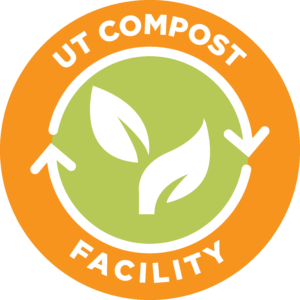
We are making huge strides on campus to reduce the amount of organic waste in landfills. One method we’re using is composting, a process that turns organic material into a valuable nutrient-rich soil additive that can be used to fertilize campus gardens and green spaces. From July 2022 to June 2023, UT composted over 2.25 million pounds of food waste, animal waste, and landscaping debris combined.
Composting is the process of taking organic materials that can be broken down naturally and turning them into a nutrient-rich soil additive. The materials that go into making compost are made up of two categories: greens and browns. Greens are rich in Nitrogen, and made up of materials such as grass, fruit or vegetable waste, and animal manure. Browns are rich in Carbon, and are made up of materials such as dead leaves, tree debris, animal bedding, and wood chips. In addition to getting the right mixture of greens and browns, water and oxygen must be present in controlled amounts inside of piles called windrows. When all these ingredients are mixed at a specific ratio, good bacteria and microorganisms propagate and break down the raw organics into a usable material we call compost!
Composting is vital in diverting organic matter from landfills. In landfills, organic matter can’t decompose properly because it’s covered under layers of trash where oxygen cannot feed the good bacteria that are naturally present in composting. Instead of breaking down naturally, these materials begin to rot as they go anaerobic (without oxygen). A direct result of rot is extremely offensive odors and high production of methane, a potent greenhouse gas that is 21 times more potent than carbon dioxide. Solid waste landfills are the single largest man-made source of methane gas in the United States. By trapping heat in the atmosphere, methane gas contributes to a large portion of the greenhouse gases fueling global warming. In 2017 alone, the EPA estimates that almost 41 million tons of food waste were generated, with only 6.3 percent diverted from landfills and incinerators for composting. Food scraps account for 22 percent of solid waste in the United States. By composting at UT, we are doing a valuable part in decreasing our carbon-footprint and emissions.
Food waste is collected in partnership with all UT dining facilities daily, while manure and other animal bi-products are collected from various sources on UT’s agricultural campus a few times throughout the week. Food and animal waste is collected by Compost Facility staff, while wood chips and other plant debris are delivered by UT’s Landscaping department. All organic waste is then brought to the UT Composting Facility, located along Cherokee Trail across from the UT Medical Center. These materials are placed into separate stockpiles, where they are then carefully mixed into specific ratios according to their different Nitrogen or Carbon contents. The mixed material is then organized into 80 foot long, 6 foot tall piles called windrows. The specific shape of the windrows allows for oxygen to flow through the material and encourage the good bacteria to break down the mixture quickly. We “turn” (or mix) the material in each windrow at least once every two weeks to allow oxygen to reach all parts of the pile. The process of decomposition produces quite a bit of heat, allowing the central temperatures of the piles to reach up to 150°F! This process continues for approximately 5-6 months, or until the material no longer measures higher than 90°F and can pass a compost maturity test. After the compost has reached maturity, it is put through a mechanical shaker-screen to filter out any large materials, such as plastic bags or other contaminants, and any organics that haven’t been broken down small enough. The finished product is a very fine compost that resembles black dirt, packed full of nutrients, and ready to be used all over campus!
Finished compost is taken to UT Organic Farms, the Office of Sustainability’s Grow Lab, UT Gardens, and in various flower beds by the UT Landscaping department. Our “Garden Compost” mixture is perfectly suited for growing food crops and other nutrient-demanding plants. On the other hand, our “Pasture Compost” mixture is well suited for erosion control and spaces where grasses or flowers need to be grown. The produce grown at UT Organic Farms is often used to feed volunteers on campus, creating a sustainable loop from food to compost and back again! Some of our compost is mixed with fill dirt to create better topsoil, which helps plant growth and landscape development. Even student organizations are eligible to receive free compost for University related research or beautification projects! In the future, we anticipate some of our compost may even be used at the Anthropological Research Facility, the “Body Farm,” for aid in forensics research!
If you are interested in taking a tour of the site, please contact edohrma1@utk.edu
We are constantly trying to improve, streamline, and expand our composting operation. We are working more closely with campus dining to collect as much food waste as possible while minimizing plastic and other contaminants. We are also making improvements to our windrow turning procedures while taking measures to make sure our site is as environmentally friendly as possible. We are making constant efforts to increase tours that educate students and faculty about composting.
Does your office or department want to participate in composting? Contact our Compost Supervisor, Ella Dohrmann, at edohrma1@utk.edu. Someone from our team will reach out to finalize your request and get you all set up!